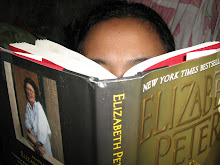A response to the pathetic explanation of why Filipinos are not nationalistic.
This country may be f*cked up. These people may have problems. But so help me, this is my country and these are my people. I can no more stop loving them than I can change the color of my skin or the genes in my DNA.
I admit that being born and growing up as a Filipino is sometimes the equivalent of growing up in a place where your family has just moved and where you do not have any other relatives. When you ask your parents about your family's past, they do not know, aside from your grandparents' names and the names of your aunts and uncles. When you try to trace your family roots in the town they said your family came from, all the records have been destroyed when the municipio burned down during the wars. Ano ngayon ang panghahawakan mo (What can you hold on to)? Well, you have your family legends. You have your lore. You have your family name. You have your family heroes. And you just keep on digging until you strike Trojan gold like Schliemann.
If you love to read up on Filipino history and culture as more than just a subject in school, you will find that there are many instances of heroism in our past. Lapu-lapu is just one example, although he is certainly always cited as the first instance where Filipinos opposed the Spanish invaders. Rajah Soliman, to whose memory a colossal monument stands in the park that bears his name, also opposed the Spaniards, as well as his relatives who had gone over to the foreign conquerors. His opposition cost him his people, his family and his own life, but by most accounts he died fighting for what he believed in.
Bonifacio acted as the head of his family when his parents died. He was the family breadwinner who brought up his brothers and sisters, and still he loved his country so much that he found the time to help spearhead a revolution. If he were a Filipino of today, yes, he would be an activist. Where is the self-interest in giving up your personal safety and that of your own family for the cause you believe in? It is easy to sit back and think that others can take part in the fight, however you have to think of number one first. Yet he did not do that.
Rizal was more than just a writer. He was an extraordinary man. If you look at all that he had accomplished in his short life, you would wonder if he ever slept at all. In a time when everyone else was subservient to the friars and the government, Rizal wrote stories, yes. Fiction, yes, but fiction depicting reality so strongly that it was banned from the country. His stories not only exposed the real situation in the islands to people abroad, but they also opened the eyes of many Filipinos to their own plight. His stories, and later his execution, catalyzed a revolution as Filipinos now strove to reclaim themselves. If a story that can touch a people's hearts and minds and change a country is not of paramount value in your eyes, then what kind of values do you have? To change a person's mindset, and to open a person's eyes, is an accomplishment that is far more difficult than it appears. Have you accomplished that?
Years after Rizal's death, the Americans were debating as to whether to grant the Philippines its independence. Most of those in the U.S. Congress opposed it, saying that they saw no indication of civilization in our people, and that therefore we still needed the guiding hands of our big white brothers. Until a congressman from Wisconsin stood up and told them about Rizal. "So, sir, I say to all those who denounce the Filipinos indiscriminately as barbarians and savages, without possibility of a civilized future, that this despised race proved itself entitled to their respect and to the respect of mankind when it furnished to the world and character of Jose Rizal." Rizal, and the congressman's eloquence, swayed the other legislators to his side and led to the passing of the Philippine Bill of 1902.
Gregorio del Pilar died at Tirad Pass at age 24, a general fighting a losing battle. Over his grave, his own enemies, deeply admiring his courage, raised a marker that called him "An officer and a gentleman." He has been likened to Leonidas of Sparta, the same king that inspired the film 300, because of the eerie similarities between the circumstances of his mission, betrayal and death and that of the legendary Spartan. How could you quote the film 300 and not even think of del Pilar?
Jose Abad Santos, far from being a clown, was a Supreme Court Chief Justice during the Commonwealth. For refusal to collaborate with the Japanese, he was executed by them in May 1942. His last words, before he was killed, was addressed to his son. "Do not cry, Pepito, show to these people that you are brave. It is an honor to die for one's country. Not everybody has that chance."
The 1986 EDSA Revolution was a phenomenon that could justifiably be called a miracle, despite claims that the spirit of EDSA is now a hackneyed concept. It was perhaps the country's most shining hour, when Filipinos from all walks of life united to drive out a dictator. Bare hands pushed back tanks, and women and children offered flowers to gun-toting soldiers. Were it a device in a novel or a film, it would be called contrived and unrealistic. Yet it happened in real life... here in the Philippines. In a country known for its internal, often bloody conflicts, a bloodless revolution stopped years of terror and repression. If you truly look at EDSA for what it is, how can you fail to be moved? How can you say that the Filipino has no heroism?
Over the course of history, many tyrants and megalomaniacs have won battles. Should they be called heroes, then? Courage and heroism, as so many sources would tell you, is not just the fool who charges into battle hoping to mow down as many enemies as he can and win from sheer strength. It is the man who stands his ground even when he knows he cannot hope to win, because he believes that he is fighting for something greater. It is the person who is willing to give his life for a noble cause, believing that his life and death would serve the greater good. It is the person who bravely does what he must, despite the jeers of his contemporaries who think him deluded and impractical for not thinking of himself first, even though he must act alone. It is the person who stands up, even though he knows he will most probably be knocked down, because he knows that the very act of standing up is an achievement in itself. If the hero wins his battle, all the better for him. But even if he doesn't win, that does not in any way diminish his heroism, which is based on the integrity of his character and not on his loss or victory.
As for culture, a person who studies his people's literature and lore will find there folk heroes to rival those of other nations. Do you know Lam-ang? Aliguyon? Indarapatra at Sulayman? Who are the ten Bornean datus? Who was Sumakwel? Bantugan? Urduja? The main reason why our own heroes and heroines are not in the limelight is that they have not been accorded much attention by our own people. Were teleseryes and movies made about them, they should be as famous as Jumong and Jang Geum. Well, if Filipinos, especially those who could read, would read their own folk literature as much as they avidly read and memorize Japanese manga or other foreign stuff, perhaps they would know more about their own culture instead of those of foreign countries.
I would be among the first to criticize negative things about this country when I see them. I know it is far from perfect. I know our people are far from perfect. But that's because we are human. We have strengths and weaknesses as all human beings have. Much as I admit and lament those weaknesses, I would not, however, presume to denigrate or suppress our strengths, for they are what enable us, as exemplified by our heroes, to rise above our frailties. Neither would I presume to denigrate those people who have sacrificed and died in the hopes of leaving me, in their future generation, with a better country, especially if I could not do the same. That would be the height of moronic ingratitude.
"Breathes there the man with soul so dead,
who never to himself hath said,
this is my own, my native land!
Whose heart hath ne'er within him burned,
as home his footsteps he hath turned,
for wandering on a foreign strand?
If such there breathe, go mark him well.
For him no minstrel raptures swell.
High though his titles, proud his name,
boundless his wealth as wish can claim.
Despite his titles, power and pelf,
the wretch, concenter'd all in self,
dying, shall forfeit fair renown,
and doubly dying, shall go down
to the vile dust from whence he sprung,
unwept, unhonor'd, and unsung."
-from The Lay of the Last Minstrel by Sir Walter Scott
Five Dramas That Are My Equivalent Of Comfort Food, Part 2
-
So, yes, well. I've added to my "comfort dramas" list in the meantime. You
know which ones I'm referring to... the dramas you tend to go back and
rewatch w...
12 years ago











